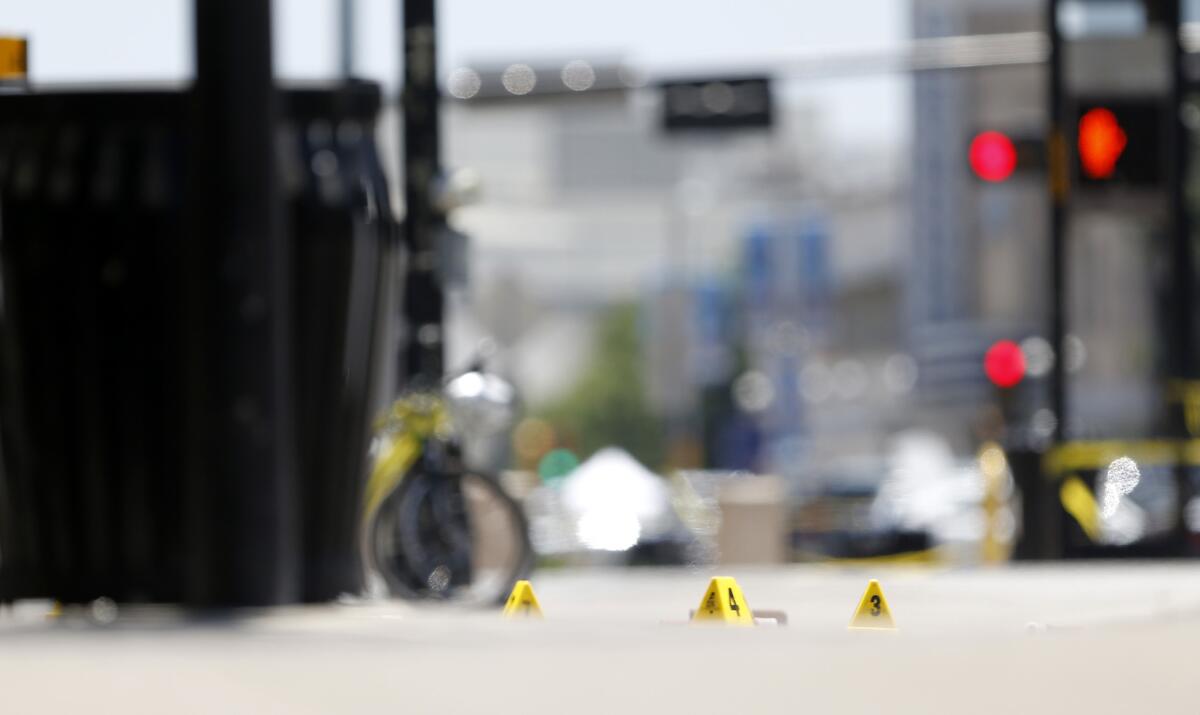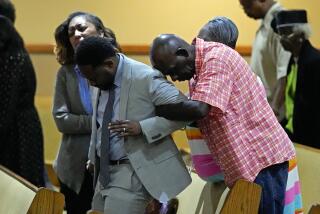Opinion: After a week of brutal shootings, America has run out of words

- Share via
On Tuesday, two Baton Rouge, La., police officers pinned Alton Sterling, a 37-year-old black man, to the ground, then shot him dead at close range.
On Wednesday, a Minnesota police officer pulled over a car driven by Philando Castile, a 34-year-old black man, then shot him dead. His 4-year-old daughter was in the backseat.
On Thursday, five Dallas police officers, patrolling a peaceful protest, were shot dead and seven were wounded by sniper fire. Details are still emerging.
There’s much to be said: about racism in American life, about gun control, about police brutality, about protest, about bystander video, about body cameras. And many of us, right now, don’t have the words. Or the words we have, we’re not sure they’re the right ones.
A number of people have written incisively and in great depth on these issues over the past few years. In the wake of this recent spate of killings, we revisited their perspectives.
Many of us, right now, don’t have the words. Or the words we have, we’re not sure they’re the right ones.
In 2014, Cord Jefferson wrote for the now-shuttered publication Matter about the racism beat.
I wonder how many more writers of color will come to the conclusion, as my colleague did, that this life we’ve made for ourselves is unsustainable. How many essays can go up before fatigue becomes anger becomes insanity? How many op-ed columns before you can feel the gruesomeness of trying to defend another dead black kid slowly hollowing you out? How many different ways can you find to say that you’re a human being?
In 2015, Brittney Cooper wrote for Salon about the need for white people to identify with the oppressive systems they perpetuate.
White people resist seeing themselves in the face of the oppressor. That mirror reflection is almost too much to bear. I get it. So then they resent the person that holds up the mirror. But let me just say as directly as I can: White people must begin to see themselves in the faces of the mostly white police officers who keep committing these atrocities against Black and Brown people. This will not stop until you recognize that you are them. These officers are your brothers and sisters and aunts and cousins, and sons and daughters and nieces and nephews, and friends, and church members. You are them. And they are you.
And Ta-Nehisi Coates wrote for the Atlantic about the insincerity of an exclusively hopeful narrative.
Two creeds can’t occupy the same place at the same time. If your writing must be hopeful, then there’s only room for the kind of evidence which verifies your premise. The practice of history can’t help there. Thus writers who commit themselves to only writing hopeful things, are committing themselves to the ahistorical, to the mythical, to the hagiography of humanity itself. I can’t write that way — because I can’t study that way. I have to be open to things falling apart. Indeed, much of our history is the story of things just not working out.
And Ross Gay wrote about Eric Garner for Poetry Magazine:
A Small Needful Fact
Is that Eric Garner worked
for some time for the Parks and Rec.
Horticultural Department, which means,
perhaps, that with his very large hands,
perhaps, in all likelihood,
he put gently into the earth
some plants which, most likely,
some of them, in all likelihood,
continue to grow, continue
to do what such plants do, like house
and feed small and necessary creatures,
like being pleasant to touch and smell,
like converting sunlight
into food, like making it easier
for us to breathe.
Earlier this week, Donovan X. Ramsey assembled a remarkable roundup of all of the issues surrounding police conduct he’s covered over the past two years.
Here we are again, as if anyone thought we wouldn’t be — as if we’ve done any real work as a nation to prevent or even discourage police officers from killing black people.
And Roxane Gay wrote for the New York Times about how this kind of unspeakable violence has become banal.
It’s overwhelming to see what we are up against, to live in a world where too many people have their fingers on the triggers of guns aimed directly at black people. I don’t know what to do anymore. I don’t know how to allow myself to feel grief and outrage while also thinking about change. I don’t know how to believe change is possible when there is so much evidence to the contrary. I don’t know how to feel that my life matters when there is so much evidence to the contrary.
And Kara Brown wrote for Jezebel about the fear that she will be writing about black Americans killed by the police forever.
I can continue to vote and go to protests and sign petitions and donate money and get in arguments with racist white people. And I can write. I can write again and again for as long as this nation piles up black bodies. But when you’ve just watched a man bleed to death after a routine traffic stop while a child sits in the back seat, it sure as hell doesn’t feel like much.
Brown’s words are grim ones to end with but, to Coates’ exhortation, let us not indulge the desire to paint a view of how our country might be different. It hasn’t been; it isn’t; we don’t know if it will be. In these times writing, even if it’s all we can do to make sense of things, sure as hell doesn’t feel like much.
Batchelor Warnke is an intern in The Times’ Opinion section. Follow her on Twitter @velvetmelvis.
Follow the Opinion section on Twitter @latimesopinionand Facebook
More to Read
A cure for the common opinion
Get thought-provoking perspectives with our weekly newsletter.
You may occasionally receive promotional content from the Los Angeles Times.











